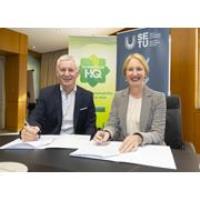South East Technological University (SETU) has signed a memorandum of understanding (MoU) with GreenTech HQ, Ireland’s first Sustainability Innovation Hub, supporting both organisations' commitment to sustainability, innovation, business, and community engagement.
The MoU was signed by SETU President, Professor Veronica Campbell and Ed Murphy, GreenTech HQ CEO and Founder, at SETU’s Cork Road Campus on Tuesday, 24 September. The MoU will focus on advancing joint sustainability objectives through shared expertise, networks, and resources, with a commitment to addressing the challenges and opportunities of sustainable regional development and supporting the green transition.
The partnership is centred on the vision of ‘Connecting for Impact’, with a focus on areas including research and innovation in sustainable technologies, skills development, and supporting enterprise with the challenges of sustainability transformation.
Both organisations will work together to promote education for sustainable development, engage with businesses and communities, and develop solutions aligned with SETU’s and GreenTech HQ sustainability goals.
Speaking at the signing, SETU President, Professor Veronica Campbell said: “Sustainability is at the heart of SETU’s mission, and this partnership with GreenTech HQ allows us to further embed sustainability into our teaching, innovation, industry engagement and community activities. Together, we can make a tangible impact on the future of our region, enhancing talent, know how, and capabilities in key sustainability areas.”
Ed Murphy, CEO of GreenTech HQ, added: “This partnership with SETU represents a significant step forward in our shared vision for a more sustainable and resilient south east region. By combining our expertise, resources, and networks, we can develop innovative solutions that not only benefit the south east region’s businesses and communities but also set a standard for sustainable development and business across Ireland.”
This collaboration is set to bring tangible benefits to the region, including enhanced research opportunities, SME collaborations, education and training initiatives, and the development of sustainable technologies that will have a lasting impact on both regional and national levels.




